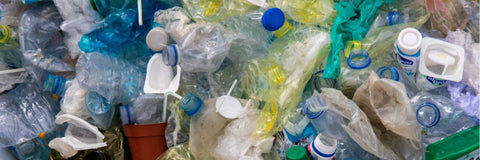We hate single use plastic
While checking out our shop, you may have noticed a common theme. We're not particularly subtle about it.
Single use plastics have become a parasitic on modern life; it's hard to escape them. Some are obvious, like bottles of water, but others are so sneaky that most people aren't even aware (chewing gun, for example. Seriously).

For years, our society has been sold the idea that plastic is fine because it's recyclable, but it's finally been admitted that plastic isn't as recyclable as we were promised. Many types of plastic simply cannot be recycled at all, or at a price that is efficient and reasonable, and the plastic that can be recycles is only able to be recycled once or twice before it's no longer viable.

So why are we still using it?
This is a complicated question, but we think it boils down to four factors:
- Convenience: Widely available, require zero advanced planning.
- Habit: We're a couple generations into plastic being so common it's almost unseen. For household products in particular, people are much more likely to continue purchasing the same brands (consider household cleaners, or condiments).
- Lack of options: All industries have latched onto plastic because it's lightweight and inexpensive. For many products, there literally isn't an alternative made of eco friendly materials.
- No obvious repercussions: In Western countries anyway, plastic seems to "disappear" so we don't give it much thought. This is definitely not the case in developing countries.

All this plastic comes at a steep price for our environment and our health. Most single use plastic products are used for a mere minutes yet take hundreds of years to break down in the environment. Consider:
- Plastic grocery bags: Average use of 12 minutes, estimated lifespan of 1000+ years.
- Bottle of water: Canadians drink 2.5 billion liters of bottled water each year, and they take an estimated 450 years to decompose.
- Plastic toothbrush: Chances are that toothbrush you've ever used still exists today. In fact, your great grandchildren may find it washed up on a beach one day!
We all know by now the consequences plastic has on the ocean, but humans aren't escaping unscathed. Plastic pollution also has indirect effects on us, as the chemicals present in plastic can leach into our food, water and soil. And it breaks down into microplastics that have been found in rainwater, snow in the arctic, and even in human blood, lungs and placentas.
OMG. What can we do about it?
Your mission, if you choose to accept it, is to avoid plastic wherever possible and choose reusables instead. For the plastic that you cannot avoid, look for the products the types of plastics that are recyclable in your area.
It could take up to two months to develop a new habit, so don't give up as you get accustomed to bringing along reusable bags when you go shopping, a travel mug when you need a coffee, and get used to new products like shampoo bars or toothpaste tablets.
Another great way to reduce your use of single use plastics is by supporting businesses (like Eco Shark 😉) that are committed to sustainability. Small businesses have more freedom to pivot their processes and are able to quickly change products, packaging and materials due to their small scale. By supporting these businesses we use our spending power to "vote" for the future that we want to see.

Is it all up to us to fix the problem?
Absolutely not!! Individuals shouldn't be taking on all the responsibility of change. The biggest impacts come from policy change. The best thing that you can do about pollution isn't recycling (though please continue to do that too) it's actually voting.
Our governments and organizations are critical in reducing plastic pollution and they are finally beginning to listen. Make sure to let your voice be heard and vote for the candidates that are taking action against pollution and climate change.










